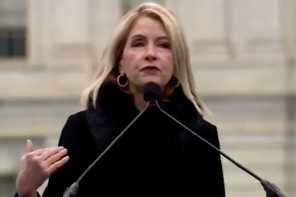I would never say that the proper response to destruction of life is to stay silent. But in the wake of the shooting in Newtown I would offer that the recognition of the loss of life, the reduction of human possibility marked out by the deaths of these young children might be beyond our limited and humble language to capture or explain.
Sometimes it is in silence that we are best able to eulogize our collective loss, and to mourn our lack of power over the circumstances that lead to such destruction.
To be sure, there were calls in the days after December 14 for this deep and meaningful silence. But what bothered me were the attempts to find space for a loving God in the context of this misery. I don’t mean the ridiculous and easily dismissed attempt to use this tragedy as a call for prayer in schools, or as a justification for reintroducing the Bible and removing secular approaches to human history.
No, I’m talking about the responses of self-understood progressive theists. How many times have you heard from well-meaning believers something along the lines of: “we can’t understand God’s plan”? Or, “God understands our pain in this moment and will work justice”?
Lodged in such responses is an age-old assumption that suffering can produce larger, positive, consequences on both the personal and communal level. Too much attention to the Book of Job or the highlighting of the death of Jesus the Christ as clear markers of the relationship between suffering and spiritual renewal has produced this knee-jerk reaction to tragedy.
I understand the desire for meaning; the yearning for purpose even in the most horrific of events. Humans by their very nature seek connections, push for meaning, but this turn to a cosmic force—a tendency to await a “word from the Lord”—clouds our ability to fully grasp the nature of human tragedy and slows our efforts to make a difference.
I am not describing the loss of faith, but rather the limits of faith in the face of tragedy. What is so important, what is so impressive, during this tragedy is not the faithful appeals to God but rather the collective human effort to comfort the suffering and to remember the value of human life.
Trying both to resolve such tragedies and keep God on the throne actually impedes our ability to process this misery. The appeal to God’s logic offers a type of cosmic cover that is difficult to remove. Looking to God and trying to grasp the workings of the divine mind actually arrests our ability to understand the deeply human nature of these acts of violence. There is no justification; there is no larger logic, no theologically exposed silver lining. This misery is all too human—the imposition of an individual’s twisted will on others with deadly consequences. Appeal to God doesn’t fix this; it doesn’t explain it.
At best we might suggest that God “dropped the ball”—failed to do what a loving God is supposed to do. Instead, it seems to me, as we read the stories of the victims we are also reading God’s obituary. By this I mean that such extreme human tragedy makes it impossible to talk about God in any useful way.
Don’t read this statement as a selfish demand for comfort, for an easy life. No, it’s recognition that nothing explains away the destruction of life’s integrity; but instead it highlights the fact that we labor in this world without cosmic aid that can protect us from us. Appeals to free will (as my comments are bound to generate) might not be a limitation God imposes on God’s self. It may simply be a weak way of saying we are in control, or what the late William R. Jones—philosopher of religion—called the “functional ultimacy” of human activity in the world.
These profound moments of tragedy slowly kill God, making it so difficult, if not useless, to speak of God in response to misery. Instead we are invited to silence. Deep silence, in which we struggle for human resolve to confront human problems. Please do not misunderstand me: I am not saying we should say nothing, that we should do nothing. I am not suggesting that complacency is the proper response, nor am I arguing that these events should be ignored. Rather, I am proposing silence concerning God, silence concerning efforts to make things better through theological twist and turns, and through the revamping of experience to fit religious categories and religious tradition.
A humanistic or non-theistic response to the misery like that encountered in Newtown centers the loss of life’s integrity, is deeply sensitive to the damage done to the collective fabric of life. And, it holds humans accountable without the cosmic aid that never seems to come. This is not to say that humanists have all the answers. Rather, in light of human tragedy, humanists might offer better questions during these challenging times, as well as a space for wrestling with these questions free of cosmic justifications—and a God clearly missing in action.
I write this not to deny comfort for those who have been directly and indirectly touched by this unspeakable act of violence. Mine is an effort to acknowledge and respect grief without so quickly pushing to find some reason behind such tragedy. This loss of life is really beyond our limited human language. The loss experienced by those families, by those associated with the school, and by the collective American and human family is so intense, so absurd, so real that it calls for our full humanity beyond any talk of God.
Those who struggled to protect, to safeguard, those young lives—and those who lost their lives to the insanity of murder are more important than any appeal to God. We humans alone must remember them, keep the beauty and value of their short lives ever present through our memorials, through our reflexive words, but also through our resolve to determine and then change the patterns of socio-political and economic life that contribute to collective misery. Think gun control as impulse control, and as a reasonable effort to preserve the integrity of life by making it a little more difficult to destroy it.
I’m not taking anything away from those grieving, but rather I am calling for greater attention to the framing of life, to the regulations, and dangers embedded in our social relationships that undergird our loss. How many guns are necessary to prove we live in a democracy? How many must die before we recognize collective life requires constraint, a humility and discipline that our pleas to a special relationship with God often damage.
We have lost too many, whether in places like Connecticut, or Oakland, or Newark. The pain cuts to the core. In this, God is not present instead these tragedies speak of God’s absence; they write God’s obituary. We—fragile, uncertain, and inconsistent—fellow human travelers are present, and we mourn the loss of life, and raise the only truly meaningful question: What must we do to prevent this tragedy from happening again?




